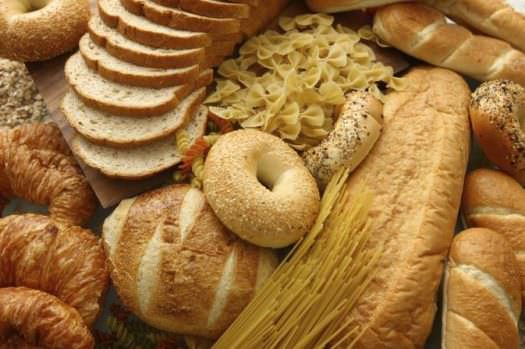12 Signs of Excessive Consumption of Carbohydrates
The carbohydrates are a major source of energy, along with proteins and fats. In other words, they are part of the essential nutrients of a balanced diet, but in a fair measure, because excess carbohydrates can have negative effects on health, increasing the risks of suffering some disorders, such as overweight or obesity, among others.
Table of Contents
How the Body Processes Carbohydrates?
When we consume carbohydrates, the digestive system breaks them down into glucose, which enters the bloodstream and is transported to cells where it is used for energy.
The hormone insulin, produced by the pancreas, helps to regulate this process by facilitating the uptake of glucose into cells. However, the body can only use a limited amount of glucose at a given time. When more glucose is available than needed, it is stored in the liver and muscles as glycogen.
The issue arises when these glycogen stores become full. Once the storage capacity is maxed out, the excess glucose is converted into fat and stored in adipose tissues.
This mechanism is a natural evolutionary adaptation that helps humans survive periods of food scarcity, but in today’s society, where carbohydrates are abundant, it often leads to unwanted weight gain and other metabolic issues.
Signs of Excessive Consumption of Carbohydrates
Excessive carbohydrate consumption can lead to a range of signs and symptoms that may affect overall health. Here’s a detailed look at some of the most common indicators:
1. Obesity
Obesity is one of the most common health problems associated with excessive carbohydrate intake. When we consume more carbohydrates than the body needs for immediate energy, the excess is stored as fat.
Over time, this can lead to weight gain, which, if not controlled, results in obesity. Processed carbohydrates, such as those found in sugary snacks, soda, and refined grains, cause rapid spikes in blood sugar levels. These frequent spikes often lead to overeating, since the body craves more sugar to maintain its energy levels.
Obesity is not just a cosmetic concern. It increases the risk of many other severe conditions, including heart disease, type 2 diabetes, and certain cancers. The World Health Organization (WHO) classifies obesity as one of the most significant global health issues, largely due to its association with excessive carbohydrate consumption.
2. Hyperglycemia
Hyperglycemia, or elevated blood sugar levels, is a direct result of consuming too many carbohydrates, particularly simple sugars. After eating, carbohydrates are broken down into glucose, which enters the bloodstream.
Hyperglycemia can lead to symptoms like frequent urination, increased thirst, blurry vision, and headaches. Over time, chronic hyperglycemia may damage blood vessels and nerves, contributing to the development of type 2 diabetes and other metabolic disorders.
3. Constant Fatigue and Low Energy Levels
While carbohydrates are meant to fuel the body, excessive consumption can have the opposite effect. When the body processes large amounts of carbohydrates, especially those high in simple sugars, it causes a rapid spike in blood sugar levels followed by a crash.
These fluctuations can lead to periods of extreme fatigue, sluggishness, and low energy. You might find yourself feeling energized immediately after consuming carbs, only to experience a severe energy drop later.
How to Recognize This:
- Feeling unusually tired after meals, particularly those high in refined carbohydrates (e.g., white bread, sugary snacks).
- A constant feeling of sluggishness, especially in the afternoon or after meals.
- A need to frequently rest or take naps during the day.
4. Dental Cavities
While often overlooked in the context of more severe diseases, dental health is directly affected by carbohydrate consumption.
Sugary foods and drinks provide an ideal environment for bacteria in the mouth to thrive. These bacteria produce acids that erode tooth enamel, leading to cavities and gum disease. Frequent consumption of sugary snacks, sodas, and other high-carb foods increases the risk of dental problems.
Over time, untreated dental issues can lead to more severe infections and tooth loss. Maintaining proper oral hygiene and limiting sugary foods are crucial for preventing these problems.
5. Acne
Diet, particularly a high intake of carbohydrates, has been shown to play a role in the development of acne. Consuming large amounts of high-glycemic index foods, such as white bread, sugary snacks, and sodas, can cause spikes in blood sugar levels.
These spikes trigger a rise in insulin and other hormones, which increase the production of sebum (oil) in the skin. Excess sebum, combined with clogged pores and bacteria, leads to the formation of acne.
6. Low Mood and Mental Health Issues
Excess carbohydrates, especially from high-glycemic foods, can also negatively impact mental health. Consuming large amounts of refined carbohydrates causes rapid fluctuations in blood sugar levels, which can lead to mood swings, irritability, and low mood. These blood sugar highs and lows can affect brain function, leading to feelings of anxiety and depression.
Additionally, diets high in refined carbs can disrupt the balance of hormones that regulate mood, such as serotonin. Serotonin is often referred to as the “feel-good” hormone, and its production can be impaired by poor dietary choices.
Over time, a diet high in sugars and refined carbs may increase the risk of developing more severe mental health issues, including depression and cognitive decline.
7. Excess Gases and Bloating
A diet rich in carbohydrates, particularly those that contain fermentable sugars like fructose and certain fibers, can lead to excess gas and bloating.
Carbohydrates that are not fully digested in the small intestine move into the large intestine, where they are fermented by gut bacteria. This fermentation process produces gas, leading to uncomfortable bloating, flatulence, and abdominal pain.
People who consume a lot of high-fructose corn syrup, sugary sodas, and processed snacks often experience digestive discomfort, as these foods are poorly absorbed and quickly fermented.
Over time, chronic bloating and gas can lead to more serious gastrointestinal issues, such as irritable bowel syndrome (IBS).
8. Poor Sleep Quality
Carbohydrate intake can affect the quality of sleep, especially if consumed in large amounts close to bedtime. The blood sugar spikes and crashes associated with carbohydrate consumption can interfere with the body’s ability to maintain stable blood glucose levels during sleep, leading to restless nights or waking up in the middle of the night.
How to Recognize This:
- Difficulty falling asleep or staying asleep after consuming high-carb meals, especially late at night.
- Waking up feeling tired or unrested despite getting a full night’s sleep.
- Experiencing disrupted sleep patterns or waking frequently during the night.
9. Increased Risk of Chronic Diseases
Excessive consumption of carbohydrates, particularly refined sugars, is linked to an increased risk of chronic diseases such as heart disease, diabetes, and certain cancers.
Elevated blood sugar levels, insulin resistance, and inflammation are all contributing factors to these conditions, making it essential to monitor and regulate carbohydrate intake.
10. Polycystic Ovary Syndrome (PCOS)
PCOS is a hormonal disorder that affects women of reproductive age. While the exact cause of PCOS is not fully understood, insulin resistance is a significant factor in its development.
Women with PCOS often have higher levels of insulin, which can result from consuming too many carbohydrates, particularly refined sugars. Elevated insulin levels lead to an overproduction of androgens (male hormones), which disrupt ovulation and cause irregular menstrual cycles.
Women with PCOS are also at an increased risk of developing type 2 diabetes, obesity, and cardiovascular disease, conditions that are closely linked to excessive carbohydrate consumption.
11. Frequent Hunger and Food Cravings
One of the key indicators of excessive carbohydrate consumption is frequent hunger. This happens because carbs, especially simple sugars, are digested quickly, leading to a rapid rise in blood sugar followed by a crash.
This crash signals the brain to crave more carbohydrates to restore energy levels. As a result, you may find yourself constantly hungry or craving sugary, starchy foods.
12. Difficulty Controlling Blood Sugar Levels
People who consume too many carbohydrates, particularly refined sugars, may struggle to keep their blood sugar levels within a healthy range.
Over time, the body becomes less sensitive to insulin, a condition known as insulin resistance, which can lead to prediabetes or type 2 diabetes.

